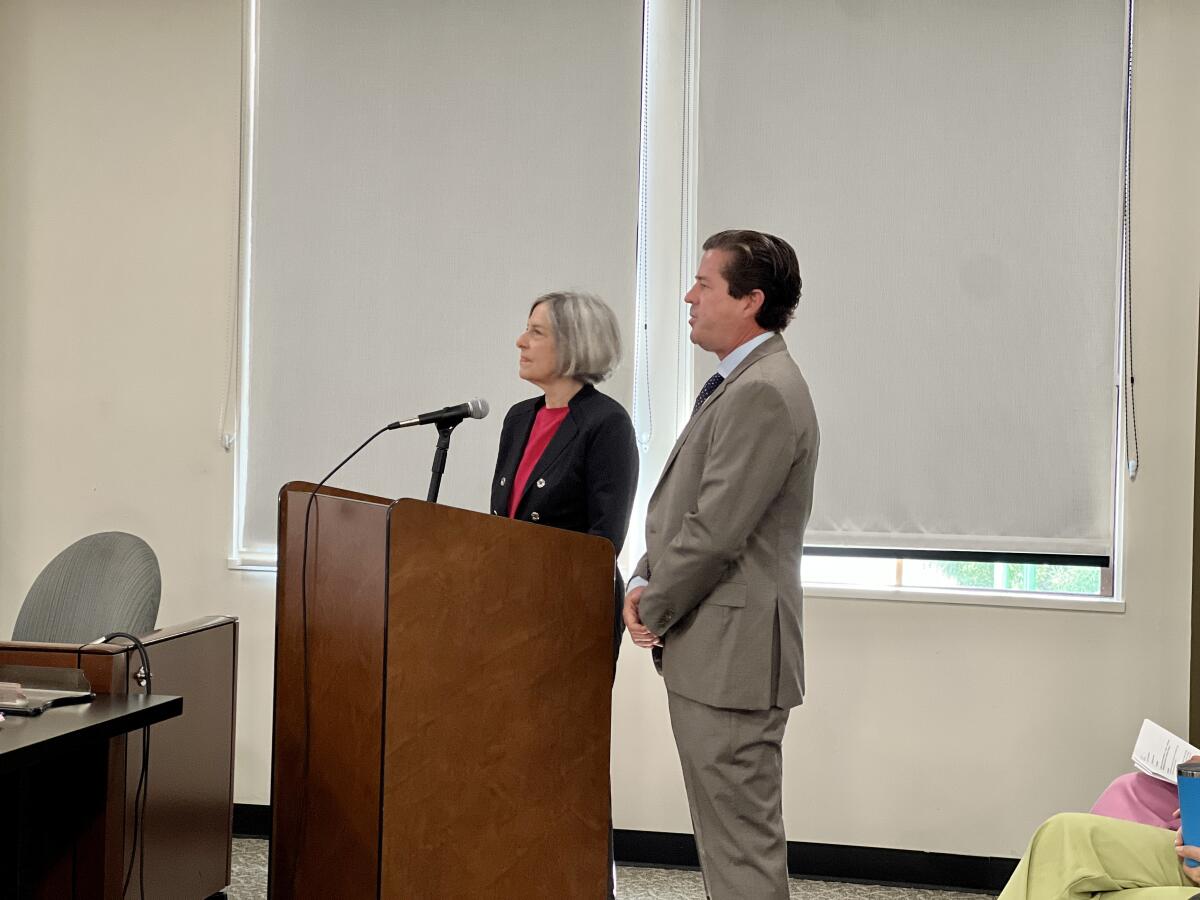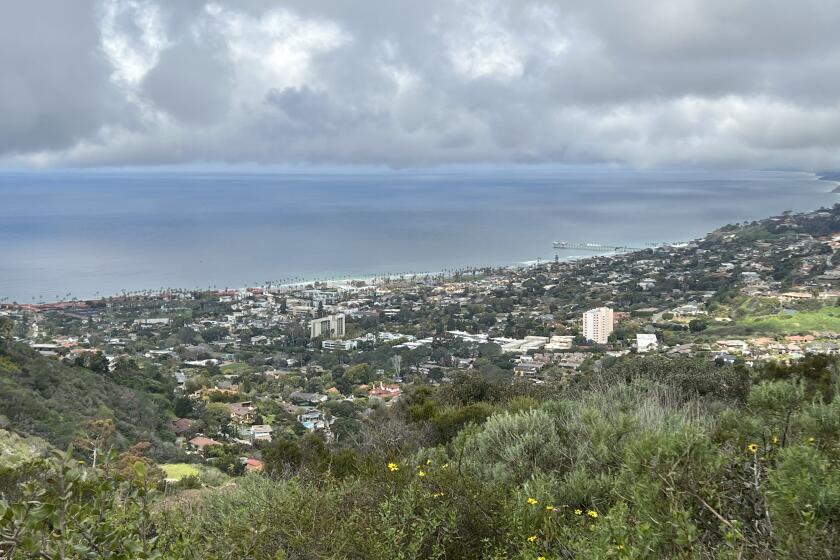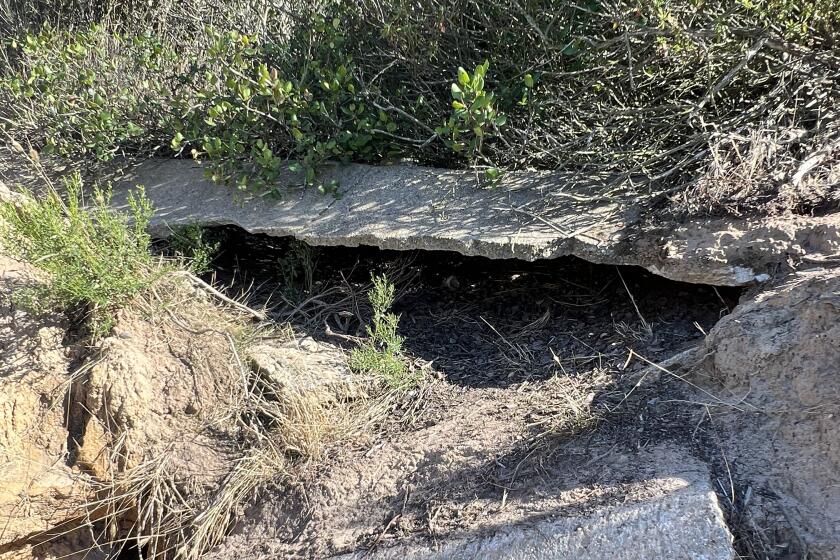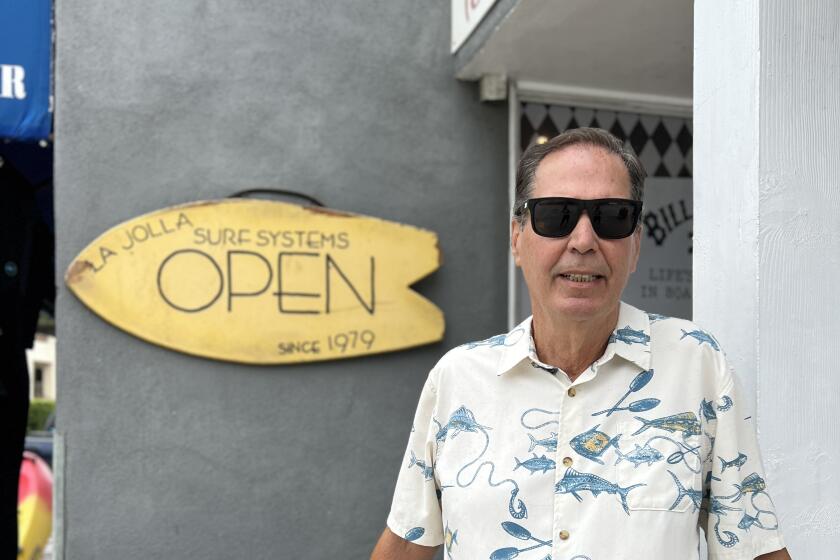La Jolla cityhood group presents its case for independence to key commission

Representatives of the Association for the City of La Jolla speak at a meeting of the Local Agency Formation Commission, which eventually would have to approve plans to secede from the city of San Diego.
The Association for the City of La Jolla, a group that is trying to make the community the 19th city in San Diego County, presented its case for seceding from the city of San Diego during the Aug. 7 meeting of the San Diego Local Agency Formation Commission.
The commission, which provides guidelines and assistance to communities in the county seeking to become cities, will need to give its blessing to La Jolla’s independence bid before it can go to a vote of La Jollans and the rest of San Diego. The proposal would need the approval of a majority of both to take effect.
The presentation at the meeting was for information only and did not include a discussion of the proposal’s merits.
The Association for the City of La Jolla, which began meeting in September 2021, has a board of six La Jolla residents and thus far has funded through donations a preliminary fiscal analysis being conducted by Richard Berkson of urban economics company Berkson Associates at a cost of $60,000.
The fiscal analysis is intended to indicate whether a city of La Jolla would be feasible. If it determines it is, the association would apply for cityhood with LAFCO. In addition, a petition supporting incorporation must be signed by at least 25 percent of La Jolla registered voters.
The borders of a La Jolla city would be from Del Mar to Pacific Beach and the ocean to Interstate 5, with exceptions excluding UC San Diego and including Scripps Memorial Hospital.
If LAFCO were to approve the proposal, it could proceed to public voting. A city has not formed out of another city in California since 1920, when Montebello seceded from Monterey Park.
The fiscal report for La Jolla is nearly complete, Trace Wilson, president of the Association for the City of La Jolla, said at the Aug. 7 meeting. “We’re sorting through the numbers right now.”
Financial analysis must show whether the community’s incorporation can be “revenue neutral, [or] do no harm to the city of San Diego,” said LAFCO Executive Officer Keene Simonds.
“This will take some time,” said LAFCO Chairman Jim Desmond, who also is a member of the San Diego County Board of Supervisors.
If the net financial impact of La Jolla cityhood is estimated as a loss for San Diego, the two could negotiate for La Jolla to pay San Diego over a certain time period to mitigate the loss.
A preliminary financial study completed in 2005 for a previous La Jolla cityhood effort estimated La Jolla would need to make $4.6 million in annual mitigation payments for three years.
If the cityhood association moves forward with an application for LAFCO approval, the commission would do a comprehensive fiscal analysis. The application likely would cost cityhood proponents “hundreds of thousands of dollars,” Berkson said.
The LAFCO analysis would seek to determine whether the proposal for La Jolla’s independence is based on accurate information and reasonable assumptions, according to Simonds.
LAFCO also would assess the proposed boundaries and whether the plan adequately covers all municipal services and is economically and socially fair to both La Jolla and San Diego. Social considerations include shopping, recreation and employment.
“We don’t want to move faster than the data dictates,” said Association for the City of La Jolla board member Janie Emerson. “We want to make sure that we’ve looked at everything, that this is a good, solid effort, that it’s not wasting anybody’s time, and then we can move forward.”
Wilson said “this will be a win for the county of San Diego, for the city of San Diego and obviously the community [of La Jolla]. ... We are one of the communities that actually can afford ourselves. We think the city of San Diego needs to focus on other areas, and we’d like to see a vision for La Jolla that actually benefits the county.”
Emerson, who also is president of the La Jolla Shores Association, noted there are problems in La Jolla that San Diego struggles to deal with, such as park and road maintenance.
“Our biggest concern was our crumbling infrastructure and the city just deteriorating in an unbelievable fashion quickly,” she said.
La Jolla “needs to be maintained up to a standard where people will want to continue to come,” Emerson said. “We would love to be able to showcase this area to bring more tourism, more commerce [and] more benefit to the entire region.”
San Diego’s size means “it’s difficult for them to carve out individual areas and service,” Emerson added. “Part of the beauty of all of San Diego is that it’s very diverse, and … different areas need different things.”
If La Jolla were independent, she said, “we can take the time, effort and money that the city spends on La Jolla … do it ourselves and then free all of that up so [San Diego] can service these other areas. It makes the whole county and the whole area stronger.”

Multiple previous efforts to make La Jolla its own city date to the 1950s, and all of them died before a formal application was filed. But this time, Emerson said, “it’s a totally different attitude and effort than it ever has been before. … This is not ‘We hate you; we’re leaving.’ … This is ‘We want to make it better for everybody and we think we can be part of the solution.’”
LAFCO Commissioner Stephen Whitburn, who also is a San Diego City Council member, asked whether the association had thought about an approach to homelessness, given that there are no homeless shelters in La Jolla.
“We already have some creative ideas” to address homelessness and affordable housing, Emerson said. She did not elaborate and said details would be left to the new city government.
Whitburn also asked whether the association has considered the impact of cityhood on water rates for La Jolla homes and businesses, since water rates “would be based on the cost of service [and] La Jolla has older infrastructure on average than the city [of San Diego] does, and lots of hills.”
“That’s a very specific question that we’re working through,” Wilson said. “Once we get to any of those solutions, we’ll come back.”
For more information about the Association for the City of La Jolla, visit cityoflajolla.org. ◆
Get the La Jolla Light weekly in your inbox
News, features and sports about La Jolla, every Thursday for free
You may occasionally receive promotional content from the La Jolla Light.





